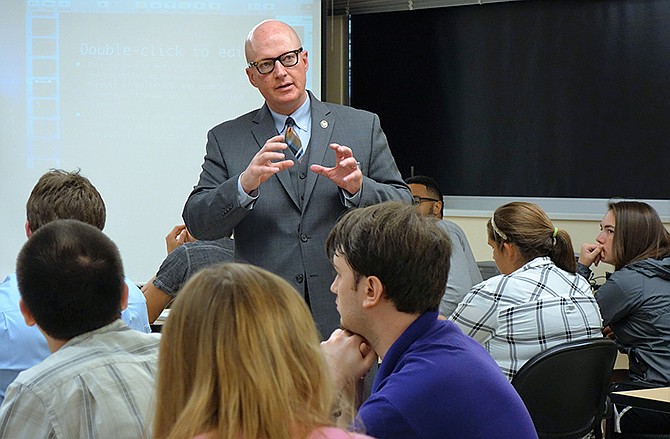The future of world dominance belongs to the nation that can produce the most innovative brains, according to an expert.
R.E. Burnett, associate dean at National Defense University, spoke at Westminster College Wednesday afternoon as part of the Hancock Symposium.
"Science and technology has determinants in international relations," he said. "We've moved into a new era in terms of what nations are doing to compete with each other. The nation states who provide the most and best brains will be the most powerful."
His job at the National Defense University includes training the future leaders in national defense security. Rather than a classroom full of 20-somethings trying to figure out what they'll do for their career, Burnett teaches classes full of members of the military.
In addition, Burnett conducts his own research as a political scientist and economist. His research, he said, has led him to the conclusion shaping minds in America is the way to remain globally dominant.
"We have to manufacture 'X' number of brains a year in order to compete in the global arena," he added. "We do this in the U.S. at a very high level. Scientific knowledge has really expanded. American-trained brains have produced a majority of the articles in peer-reviewed science journals."
The rise of the higher education system in the United States has significantly influenced the country's ability to produce domestic and global minds.
"In the past, brains appeared somewhat randomly," he said. "Today, states seek to grow more of them at a higher level. The world has also generally chosen to come here to study, and we have generally accepted them here."
However, Burnett said world powers historically have risen and declined. The answer to a U.S. decline in power is an increased investment in education, he added.
"We have to be able to invest money into
scientific research not knowing what we'll get out of it," he said. "That's an increasingly difficult sale in today's Congress. We live in world that's more globalized than ever. If we want to have greater scientific achievements, we have to deal with the local policies, as well."
One of the interesting conundrums in the U.S., Burnett said, is people mixing democracy and science.
"The practice of science is not a democratic process," he added. "Science takes place within a democratic process. There's a formula we follow, and it's the only path to truth. We do not vote on it."
However, the debate on various topics do not affect the national security plan in this country, Burnett said. The plan has always been focused on preparation.
"The Pentagon's position on global warming is clear," he said. "The doctrine is that they're going to be prepared for rising sea levels. I don't care whether you believe it or not, you're going to train for it, and you're going to deal with it."
The Pentagon, Burnett said, is focused on keeping the country safe.
"At the end of the day, the Pentagon is a risk management organization," he said. "We will be shy of nothing. We will plan for it, and we'll be ready for it."
To remain relevant on a global stage, Burnett said, the U.S. may need to increase educational spending.
"We need to build minds on an annual basis," he said. "I'm not concerned with where they come from. To be able to empower the military, I don't care where they come from. We are known as the first hyper power to even exist. As we start coming down, it may be necessary to increase spending if we want to remain hyper power."
Jakob Shill, a student who attended Wednesday's presentation, said the new angle Burnett introduced to national security was something he hadn't thought about.
"I thought it was important because he was talking about how as a strategy of national defense, they account for more brains and innovation," he said. "It makes sense, but I don't know if I've ever seen that."
Shill said the message was also important, especially coming from Burnett.
"I thought it was really interesting coming from him," he said. "That's the interesting thing about the symposium. You learn their background and careers. It was really interesting coming from that."
Sydney Franklin, a junior at the college, studies national security. She said the presentation was very thought provoking.
"I thought it was very interesting," she said. "(As a student) you study all these things. I thought it was interesting as it all relates to the use of technology."
Shaping young minds, Burnett said, is precisely why he chose to pursue a career in education.
"It's why I'm here," he said. "My students are 30-, 40- and 50-year-old military members. It's a treat to get back to undergraduates and learn what the next generation is thinking."
Burnett added the current state of the world calls for more innovation from younger generations.
"We're living in a complicated world," he said. "We are dealing with dangerous enemies and doing the best to come up with the best strategies to affect positive outcomes for the U.S."

